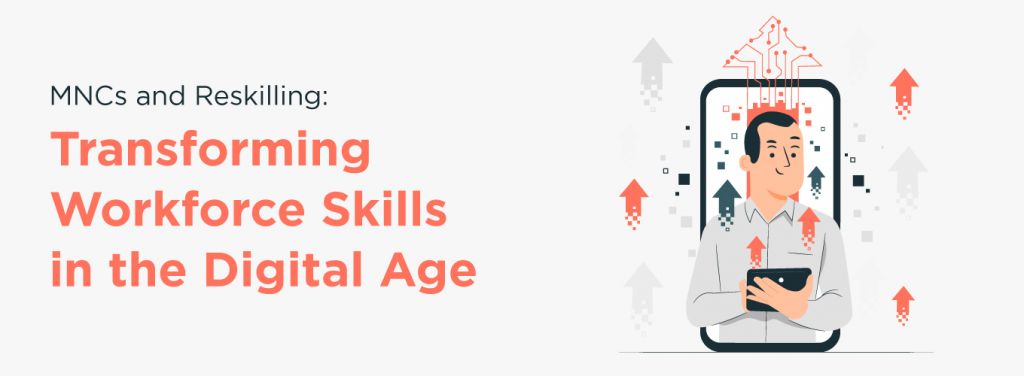In this dynamic digital age, international corporations (MNCs) realize the competitive necessity of upskilling. The Fourth Industrial Revolution has caused unparalleled changes in technology, which has led to the need for a workforce with catered skills to manage the digital world. Let us try to understand how MNCs are introducing proactive reskilling strategies to their existing employees and creating an environment that nurtures learning and makes it a continuous process.
Table of Contents
What is reskilling?
Re-skilling is the process of changing the course of your career by acquiring completely new abilities, frequently involving a move into a different industry or profession. A valuable strategy for career reinvention and job market adaptation is reskilling.
In the age of AI, the significance of reskilling only continues to grow and develop. There will be a time when engineering graduates might have to start learning concepts and skills which are completely foreign to their course and such will be the case for many graduates irrespective of what field one chooses to pursue.
The Imperative for Reskilling
While the rate at which Technology evolves keeps rising, the required skills by the job market are constantly changing. MNCs often face issues such as making the local workforce competitive and up-to-date.
To be ready for the future, competent talent must be developed and retained to take on new and emerging roles. A LinkedIn Workplace Learning Report states that 94% of workers are more inclined to stick with a company that makes professional development investments. Employee commitment and loyalty are increased by reskilling.
Automation, artificial intelligence, and digital transformation have also transformed the industry profoundly and employees need to have new skills to compete successfully in the transforming environment. Reskilling is no longer something just to counter the effects of technology, rather, it has become a critical necessity to ensure survival in the digital era.
MNCs as a Common Cause of Change
Advancing MNCs grasp that reskilling is not only about filling present skill gaps; but also, about being prepared for future disruptions. These groups are intensively working towards broad reskilling initiatives that would equip their employees with the competencies needed and required in the future job market. In this way, MNCs become the forefront of innovation drivers and recruit top-level talent looking for a career path that involves ongoing growth.
Tailored Reskilling Programs
MNCs are embracing a customized approach to reskilling, acknowledging that the solution that worked for one employee is not universal. These programs take into account employees’ specific requirements and objectives, therefore, retraining processes are in line with personal career goals. Personalized learning paths will enable employees to be equipped with actual skills and develop a sense of ownership, thus motivation will be the driving factor in their professional development.
Technology-Driven Learning Platforms
Multinational corporations are utilizing technology to make reskilling more user-friendly and entertaining. Learning platforms, virtual classrooms, and interactive modules available online offer the chance for employees to learn at their convenience. Interactive components, namely badges and leaderboards, make learning more engaging and create a cooperative atmosphere where people compete with friendly attitudes and then try to improve their results.
Soft Skills Development
Apart from the technical skills, the MNCs, too, consider soft skills to be very important in the digital age. Effective communication, collaboration, and adaptability are already more important in a globalized and digitally linked world. Educational programs on reskilling have soft skill modules aimed at assisting employees to be acquainted with the paramount soft skills that enable them to be general enough to thrive in diverse and dynamic work environments.
Measuring and Assessing Progress
MNCs are sprouting reliable methods for verification and monitoring the progress of their reskilling initiatives. Data analytics and performance indicators are used to track employee engagement, skill acquisition, and program effectiveness rates. Ongoing loops of feedback allow organizations to adapt and hone their reskilling strategies, assuring that they always stay in tune with any evolutions in the market and growing needs of the business.
Cultural Shift towards Lifelong Learning
Reskilling is a lifelong journey, not a one-off event. MNCs are now taking the lead to institutionalize this change by promoting a learning culture characterized by lifelong learning, and an attitude of continuous improvement. Not only encouraging learners but also establishing an environment that supports a learning culture will ensure a workforce full of resilience and adaptability capable of overcoming uncertainties and being ready to embrace new challenges boldly.
Inclusive Approach to Reskilling
MNCs are now taking an inclusive approach to reskilling employees and making sure that people at different levels and, employed in various departments, have equal opportunities for skill development. This inclusivity broadens the ability of the firm to hire workers of diverse skill sets and diverse perspectives, which creates a more collaborative and creative workplace. It does not only assist in the reduction of skill gaps within the organization but also it helps to mitigate workplace risks.
Conclusion
In the digital economy, workers should be re-skilled for MNCs to compete favorably and prosper in a fast-changing business world. Through different tailored programs, partnerships with educational institutions, the use of technology, culture of life-long learning, these organizations are currently tackling the skills gap and are preparing for future challenges and chances too. Reskilling becomes more than following the technology; it is about making the employees able to act as versatile assets in the open and changing economy. Along with my role as an MNC, I play a prominent role in the transformation of the workforce. This impact is on both individual careers and the future of work for industries and economies worldwide.
FREQUENTLY ASKED QUESTIONS
1. Why is skill rebuilding crucial in the digital era?
Reskilling is paramount for the workforce to keep abreast with technological evolutions to remain relevant and capable of adjusting in a fast-changing digital environment.
2. How do MNCs lead in the transformation of the workforce?
MNCs are front-runners in the space, undertaking innovative strategies and funding retraining programs to make the labor force ready for the complexities of the digital era.
3. What advantages do multinational companies and workers earn through successful retraining programs?
Proper reskilling gains personal career wights as well as improves the competitiveness of MNCs by generating a dynamic and versatile workforce to confront the challenges and opportunities of the digital age.









